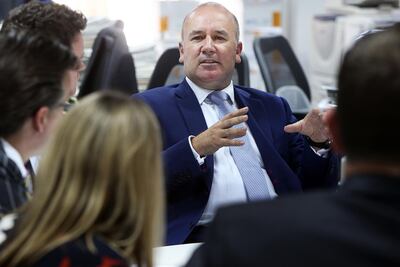The UAE Insurance Authority is pushing ahead with more stringent life insurance regulations to overhaul how savings, investment and life insurance policies are sold in the Emirates.
Experts say the latest draft of the government body’s new measures — published on its website on January 31 — firms up previous versions. These were released by the IA in November 2016 and May 2017 after the body said it had received “an alarming amount of complaints” from residents over the heavy commissions and upfront fees associated with conventional insurance and Takaful products.
The latest draft focuses on commission caps for lump sum investments and fixed-term contractual plans and offers clearer guidelines on how transparent a sales adviser must be about a product’s fees.
What do the proposed regulations cover?
The new measures include a cap of 4.5 per cent on the sale of lump sum portfolio bonds or offshore bonds by advisers from insurance firms — much lower than the 9-14 per cent currently paid out. On contractual savings plans - insurance wrappers that combine a life insurance policy with an investment plan - the IA draft says there will be an overall cap with 90 per cent of a customer’s first year contributions to the scheme allowed to be taken in commission.
Commissions which were previously paid upfront to advisers on the full value of an insurance policy (known as indemnity commission) will now be restricted to 50 per cent of the annual premium in the first year with the rest drip fed over the term of the product.
Philip Rose, a chartered wealth manager at financial product promoter Halwyn, which is licensed by the Emirates Securities & Commodities Authority (SCA), says this means point of sale commissions earned when products are first sold will drop “by 50 per cent or more due to the commission caps”.
The draft also says sales advisers must provide customers with a detailed schedule of fees and commissions for the policy’s entire life cycle and customers have the option to cancel a policy within 30 days.
There are also changes to the licensing for individuals involved in advising and selling life products. Tom Bicknell, a partner in the Dubai office of law firm Pinsent Masons, says there will now be two licenses - insurance producer and investment adviser - with the insurance producer licence allowing an individual employed by an IA-licensed entity to sell life products.
“If an insurance producer wants to also provide investment advice they must also obtain the investment adviser licence,” says Mr Bicknell.
When will the new regulations be enforced?
While the IA has not indicated when the regulations will be implemented, the authority has invited comments on the draft. Sam Instone, the director of financial advisory AES International, says once the regulations are published in the Official Gazette, alignment periods range from “the next day to two years for different parts of the regulations to be implemented”.
Mr Rose says commission caps have a two-year phase in, while disclosures have a one-year phase in. However, Article 6 of the draft, which handles the payment of fees - whether upfront, fixed, advice, management or trailing to the insurance producer or investment adviser - has immediate implementation once the rules are added to the Gazette.
“This will put pressure on advisers to consider having to invoice clients directly for their fees and also offer full disclosure from day one and not wait for the phase in periods. Failure to do so could leave them open to claims from clients,” Mr Rose says.
How will the changes benefit UAE investors?
Mr Instone says there may be “slightly improved outcomes for consumers”.
“As well as the commission caps there are a number of additional regulations in relation to providing illustrations and getting declarations from policyholders that they have received these and understand them,” he adds.
Mr Bicknell says the disclosure requirements whereby advisers have to really explain the performance of the product and the fees, is "the most welcome introduction".
"But what is essential is that the disclosure rules are then enforced by the regulator," he adds.
Mr Rose says illustrations of a product’s outcome must now show the product fees as well as the fees of the underlying funds.
“At present these underlying fund charges are not included in most life company illustrations, resulting in artificially flattering illustration results," he says. "This will now have to reflect both lower gross returns and more charges."
How will it affect insurance brokers?
Mr Rose says the reduced incomes for advisory firms selling insurance-linked products “will inevitably lead to casualties among advisers and firms that cannot adapt their business model” to a UK-style “service-fee-on assets under management” approach.
“The disclosure rules will reinforce the negative impact on advisers’ revenue simply because a large proportion of clients just don’t understand how much they are actually paying in commissions. The way that fees are described in product literature and then amortised over 10-year plus time periods when they have actually been charged and paid out at point of sale is about to be exposed. So a double-whammy impact on advisers of 'less fees per client' and potentially 'less clients' too.”
How will the life industry be affected?
Mr Bicknell says the industry has been aware the rules are coming for some time with many stakeholders already adapting their operations and financials. Advisory firms will also have to restructure their remuneration models significantly and licence each of their staff, he adds.
Mr Rose says life companies based outside of the Isle of Man that were previously considering moving to another jurisdiction to avoid the island’s Conduct of Business Code and commission disclosure rules will now have to comply with similar rules in the UAE market.
Walter Jopp, chief executive, of Zurich Middle East — one of the leading providers of fixed-term contractual saving products in the UAE — says the company continuously aims to improve its solutions and services to benefit its customers and “adhere to all local regulatory requirements”.
Nigel Sillitoe, the chief of Insight Discovery, a research and communications company which set up whichfinancialadviser.com to ensure residents only take advice from qualified advisers working for regulated firms, says the industry is changing for the better.
“One example is that a greater number of advisers are taking exams with professional bodies like the Chartered Insurance Institute, which recently set up an office in the UAE," he adds.
What can customers unhappy with existing policies do?
Customers who feel they have been mis-sold a product can report it to the Insurance Authority.
Mr Bicknell says while the draft rules have real teeth when it comes to a breach, “there is no additional complaints procedure introduced”.
“The IA already had a complaints process so it is likely they will just seek to continue relying on that,” he adds.
Sean Kelleher, the chief executive of Mondial, a SCA-licensed financial advisory, says some investors end up confused because there are a number of different regulators in the UAE's financial services industry.
“A one-stop complaint shop would provide a significant clearing for all investors to run to for comfort," he adds.
Do the changes signal the end of the 25-year investment plan?
With insurance-linked savings and investment products deemed ineffective, expensive and inflexible by many industry pundits, their days may be over.
Steve Cronin of financial education community DeadSimpleSavings.com says the commission structure on insurance-linked products offers a lower return on investment compared to a DIY approach that focuses on low-cost, index-tracking funds.
However, Mr Kelleher of Mondial, which switched from a commission structure to a salary and bonus structure in 2017, says insurance wrappers are "useful tax-planning constructions in a number of different jurisdictions”.
“Life insurance is hardly an enemy, it’s a very good idea, a must-have in any financial plan," he adds. "If by adding savings into it there are planning benefits, why not? The enemy is the hiding of fees within contracts, the lack of transparency and mis-selling.”
What are the alternatives for investors?
While independent personal finance communities such as SimplyFI.org and Mr Cronin's DeadSimpleSaving.com advocate a low-cost investment approach, these require residents to set up their own investment portfolios.
This can be done by setting up a brokerage account with companies such as Interactive Brokers, Saxo Bank or Swissquote to then invest in a globally diversified portfolio of low-cost, passive index-tracking ETFs.
However, the financial advisory industry is also evolving, with some cheaper savings options for investors that still want a regular saving vehicle and traditional financial advice.
Mr Rose of Halwyn for example, has developed FlexGlobal, a low-cost flexible investment solution that has no lock-in period, minimum investment limits or fixed savings terms. It comes with a 0.45 per cent administration fee and investment fund charges that start from 0.08 per cent.
Meanwhile, advisory firm Abacus Financial Consultants has turned its back on commission-laden plans, rolling out a 3-2-1 account — a lower-cost savings product that allows residents to invest on a monthly basis without being locked in to a fixed period and total annual fees of about 2.3 per cent.
"We wanted to arrange investment accounts for our clients that we would want to participate in ourselves so we have gone far beyond the requirements of the regulator and done just that,” says Cornelius Lillis, co-founder and managing director of Abacus.






